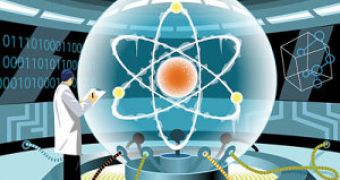Though scientists believed that fully functional quantum computers won't be introduced sooner than 2030, a commercial company has already announced the completion of such an impressive device.
The D-Wave company from British Columbia is ready to demonstrate the capacities of their own quantum computer next Tuesday. Company officials claim that the supercomputer can carry out 64,000 calculations simultaneously with the aid of a new technique which is said to revolutionize the world of quantum computing itself. However, the academic authorities are quite suspicious and will give their verdict only when the device is showcased.
D-Wave is proud to announce that it is the world's only "commercial" quantum computing company, backed by more than $20 million of venture capital. Ultimately focusing on consumer products, the company promises to eventually produce commercially available quantum computers that can be accessed over the Internet or shipped to specially designed computer rooms, where they could be programmed to solve problems such as financial optimization in a more efficient way.
Quantum computing technologies are bound to obliterate current computer security systems, cracking any current cryptography scheme by providing an unlimited amount of simultaneous processing resources. According to quantum physics, it is known that quantum elements exist in multiple states at the same time, so every quantum bit or "qubit" in quantum devices is simultaneously 0 and 1. D-Wave's current prototype can only work with 16 functional qubits, but the future systems that will include hundreds of qubits would theoretically be able to deal with more inputs than there are atoms in the Universe.
When talking about the announced quantum computer, scientists already split in two groups: the enthusiastic one and the doubting one. "This is somewhat like claims of cold fusion," said Professor Andrew Steane of Oxford University's Centre for Quantum Computing, as an adept of the doubting group. Steane further thinks that this computing method can't really be substantially easier to achieve than any other.
Quantum computers may prove to mess around with parallel universes which could lead to temporal distortions. Maybe the announced supercomputer has probably invented itself in the future and sent itself back through time.

 14 DAY TRIAL //
14 DAY TRIAL //